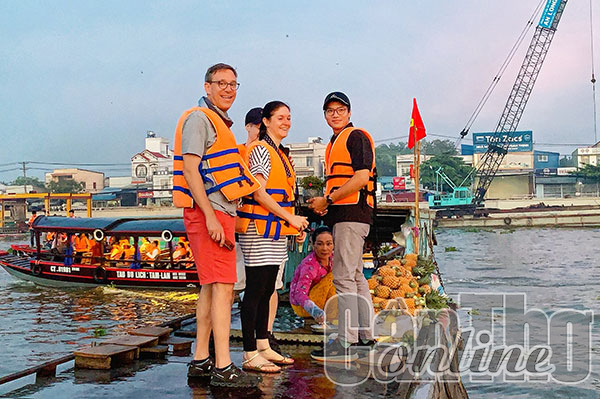
The challenges are stacking up
Adjustment of the Tourism Development Master Plan for Can Tho City until 2020, with a vision towards 2030, has set specific targets. By 2020, the tourism industry is projected to employ approximately 39,300 workers (including 13,100 direct workers and 26,200 indirect workers), with over 80% of the tourism workforce having received specialized training. However, in reality, the proportion of trained tourism personnel in Can Tho by 2020 only reached 68.3%, falling short of the set target. Meanwhile, the period from 2019 to 2021 witnessed significant impacts on tourism due to the COVID-19 pandemic. Many hotels, resorts, and travel agencies were forced to close or reduce their workforce. Numerous tourism workers shifted to other industries.
Mr. Truong Van Vinh, Director of IDO Can Tho Tourism and Event Trading Co., Ltd., shared, "After the COVID-19 pandemic, the quality of tourism personnel in Can Tho and the Mekong Delta region has undergone significant changes. Many experienced individuals have transitioned from tourism to other professions or relocated to other provinces. In particular, there has been a significant influx of workers moving to Phu Quoc and Ho Chi Minh City, causing a severe shortage of tourism personnel in Can Tho and the Mekong Delta region." Sharing the same view, Mr. Tran Manh Khang, Head of the Can Tho City Tour Guides Association, stated, "There is a severe shortage of tour guides in the Mekong Delta region, especially for the inbound market (foreign tourists visiting Vietnam). The supply is almost insufficient. Can Tho and the Mekong Delta region are facing challenges in terms of tourism personnel, particularly inbound tour guides. Therefore, the local authorities need to establish guidelines to urgently supplement this workforce in order to meet and seize the current opportunities in international tourism."
Ms. Nguyen Minh Tho, the Principal of Can Tho Tourism College, stated, "Over 90% of our students and graduates have found employment in their respective fields. They are highly regarded by tourism businesses for their expertise and professional skills. However, foreign languages remain a common weakness among the tourism workforce in the Mekong Delta region. On the other hand, the tourism market in Ho Chi Minh City and Phu Quoc Island is more attractive than in Can Tho City and other Mekong Delta provinces." In reality, Can Tho City is home to several universities such as Can Tho University, Tay Do University, Nam Can Tho University, and FPT University, all offering tourism-related majors. Among them, Can Tho Tourism College, under the Ministry of Culture, Sports, and Tourism, specializes in providing comprehensive training for personnel in this field. Therefore, on average, these institutions supply hundreds of tourism-related graduates each year, but the labor market in Can Tho City still faces a shortage. Some of these professionals have transitioned to markets with more developed tourism sectors. Additionally, this workforce cannot immediately meet the practical job requirements of tourism businesses. According to travel agencies and hotels, personnel recruited must undergo retraining due to inadequate soft skills and professional competencies. The limitation in foreign language proficiency stands out as the most prominent issue.
Furthermore, the quality of trained personnel is not consistent. Among the management agencies, training institutions, and travel companies, the training success rate reaches 100%. However, the lowest rate of training achievement, at 26.1%, is observed in tourist areas and destinations. In most garden spots, homestays, and tourist sites, self-management is prevalent, and the staff primarily consists of untrained and non-professional laborers. Meanwhile, certain transportation personnel, including road and waterway transport workers, especially boat drivers in floating markets, directly impact the tourism industry, but the quality of their training remains a concerning issue.
It is evident that the tourism workforce in Can Tho City is lacking and faces instability in terms of both quantity and quality.
Suggestions and recommendations.
Mr. Tran Manh Khang, the Head of the Can Tho City Tour Guide Association, proposes, "Given the difficulties in the tourism workforce in Can Tho City, I recommend that local authorities organize multiple training and development courses, with a focus on inbound tour guides, and create conditions for tourism personnel to obtain proper certification. The tourism industry in the city should also have a direction for training high-quality human resources, targeting markets that speak languages such as Chinese, French, Japanese, and Korean, or countries that Can Tho City is planning to connect with and open-air routes. Furthermore, to facilitate management and ensure the quality of tour guides, I suggest organizing a competition to rank tour guides in Can Tho City to gradually standardize the tour guide team." On the other hand, Ms. Nguyen Minh Tho, the Principal of Can Tho Tourism College, states, "In the near future, our college will enhance the inclusion of foreign language classes in the curriculum to produce higher quality graduates. Additionally, we are establishing partnerships with many tourism businesses in Can Tho City and the Mekong Delta region to establish practical connections and provide opportunities for students to gain hands-on experience in the working environment. This allows businesses to select suitable personnel without the need for additional training. I also propose that local authorities organize numerous activities and large-scale tourism events to attract international and domestic tourists to Can Tho City. Only then can we create a vibrant tourism market that attracts tourism personnel."
Furthermore, Ms. Nguyen Minh Tho believes that the city's tourism industry should regularly conduct surveys and inspections of tourism businesses and accommodation facilities to remind them about the importance of training and professional development for the workforce. Mr. Truong Van Vinh, the Director of IDO Can Tho Tourism and Event Trading Co., Ltd., suggests, "In the short term, the local tourism industry should strengthen development and training programs tailored to specific target groups. It is necessary to establish connections and exchanges between businesses and students through experiential activities or conferences for sharing experiences. In the long run, there is a need for a clear direction in training high-quality human resources."
Aiming for a high-quality, effective, and practical tourism workforce is one of the key factors for Can Tho City to bring about transformation in the development of this sector. Therefore, over the years, the city's tourism industry has been constructing various programs, initiatives, and plans to gradually improve the quantity and quality of the workforce. On average, there are 5-6 vocational classes organized each year, targeting transport owners, farmers, and small traders engaged in tourism-related activities. In the long term, the local authorities have also developed detailed plans for the development of high-quality human resources. According to the orientation towards 2025, Can Tho City aims to attract around 10,000 direct laborers in the tourism industry, with a proportion of 75% having undergone training, professional development, and language skills. The orientation towards 2030 is to attract approximately 12,000 direct laborers in the tourism industry, with a proportion of 80% having undergone training, professional development, and language skills. Currently, the city's tourism industry is reviewing the implementation results of Program 01/CTr-UBND dated January 3, 2018, by the People's Committee regarding the development of tourism human resources and raising awareness for the period 2018-2020, with an orientation towards 2030 in Can Tho City. From there, appropriate adjustments and additions will be made to suit the new circumstances.
In addition to tourism products, the workforce is an indispensable component in the smoke-free industry. However, for many years, the tourism workforce in Can Tho City has been lacking both in quantity and quality. Several reasons have been analyzed, and the city's tourism industry is seeking solutions to overcome difficulties, considering that the tourism personnel issue involves various relevant units, industries, and market mechanisms. Training the workforce to adapt and adjust to the pace of market development is crucial for achieving effectiveness. Therefore, it requires the coordination and collaboration of state management agencies, training institutions, businesses, and the workers themselves. Only through such collective efforts can the difficulties be gradually overcome, leading to a transformation in retaining and attracting tourism personnel.
Source: Can Tho News - Translated by Hoang Dat












